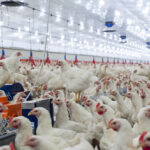Big chickens create big problems: Antibiotics are only one of them
 (NaturalHealth365) Chicken is the average person’s meat of choice, yet most people don’t think about how this commercially produced food makes its way to the dinner table. This tasty meat is beginning to pose some serious health concerns for reasons that will surprise some readers. In particular, medical professionals, nutritionists, and health experts are questioning whether the antibiotics provided to chickens might be harmful to human health.
(NaturalHealth365) Chicken is the average person’s meat of choice, yet most people don’t think about how this commercially produced food makes its way to the dinner table. This tasty meat is beginning to pose some serious health concerns for reasons that will surprise some readers. In particular, medical professionals, nutritionists, and health experts are questioning whether the antibiotics provided to chickens might be harmful to human health.
The question is whether the antibiotics and sustenance used to make chickens large and supposedly “healthy” are a net negative. The little-known truth is that antibiotics are only one of many potential health-related issues tied to industrial chicken processing operations. So let’s take a look at the truth about the meat industry.
Antibiotics pumped into chickens have detrimental effects
Though the average person might not care that the massive chickens living at animal farms are loaded up with antibiotics, those who study human health and biology for a living are beginning to question whether the use of such antibiotics is prudent. Antibiotics are given to chickens at industrial facilities to ward off infection amidst overcrowded living conditions. Antibiotics also help fatten birds without spending on additional feed that would take a chunk out of the enterprise’s bottom line.
As a result, chickens have ballooned from their average weight of a couple of pounds back in the 1920s to over half a dozen pounds.
It merely takes two months for a chicken to reach six pounds, yet it took nearly twice as long for the chickens of “yesteryear” to hit 2.5 pounds on the scale. Though the industry’s leaders don’t like to admit it, the truth is an investigation conducted by Reuters in 2014 found the United States Food and Drug Administration (FDA) passed guidance that restricted antibiotics, yet companies ramped up the use of antibiotics all the more. Even one of Kentucky Fried Chicken’s suppliers, Koch Foods, was nabbed red-handed using antibiotics.
Bigger isn’t always better
There is a good argument to be made that increasing the size of chickens is a positive as it generates more sustenance. Though today’s chickens are larger than those of a couple of decades ago, they need about 7% less food per pound for optimal growth. In addition, larger chickens tend to have more health problems, including leg issues, as they carry additional weight. However, farmers have started to breed chickens for optimal leg strength.
The question is whether the industry’s leaders are succeeding in establishing the delicate balance between chickens living with a modicum of dignity and optimizing their value. The modern chicken farming industry is economically efficient, providing customers affordable meat without a lengthy wait. As a result, chicken has become the country’s most popular type of meat and also one of the country’s most economically efficient meals.
Antibiotics will be used for the foreseeable future
If factory farmers were to eliminate antibiotics altogether, an additional 175,000 tons of feed would be required to support the country’s turkey population. Furthermore, if antibiotics were not included in animal feed, that sustenance would prove significantly less efficient, and animals wouldn’t make proper use of the available nutrients.
As a result, it is safe to say antibiotics will likely continue playing a role in factory farming. If you’re looking for a healthier alternative, find a local (organic) farmer to supply your food needs. These local farmers tend to avoid the use of toxic drugs, provide a healthier environment for their animals and do not feed their animals genetically manipulated food.
Sources for this article include:



